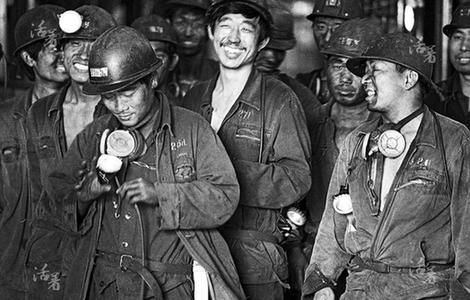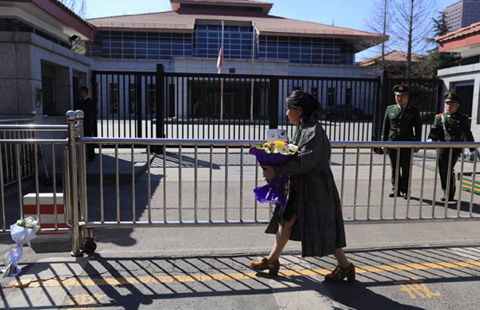Japan needs Murayama spirit
Updated: 2015-03-24 08:11
(China Daily)
|
||||||||
|
Former Japanese Prime Minister Tomiichi Murayama poses in front of portraits of former leaders of his Social Democratic Party after an interview with Reuters at the party headquarters in Tokyo March 10, 2015. [Photo/Agencies] |
Only through profound reflection on the aggression it launched against China can Japan possibly regain the trust of the Chinese people and enjoy a bright future in its ties with its neighbor.
This year marks the 70th anniversary of the end of China's War of Resistance Against Japanese Aggression and the world's victory against fascism. There have been calls by victimized Asian countries, including China, for Tokyo to take a responsible attitude toward this part of its history. Some US officials have joined them in expressing the hope that Japanese Prime Minister Shinzo Abe's government will follow the example of former Japanese prime minister Tomiichi Murayama and show genuine repentance for the suffering it inflicted on its neighbors.
Despite the peaceful development road Japan embarked on after World War II, there have always been political forces within Japan who stubbornly refuse to even admit its wartime crimes. Japan's enormous economic achievements in the postwar decades fueled attempts by its conservative political forces to overturn its wartime history.
Yet the remarks made by Murayama in 1995, in which he apologized for the "tremendous damage and suffering" Japan caused to Asian people, helped repair Japan's ties with its neighbors and also raised its international reputation.
Regrettably, the Murayama spirit has not been consistently upheld by his successors. Current Japanese officials, including top officials, have continued to make public comments denying the "comfort women" and other wartime atrocities, seriously harming Japan's ties with neighboring countries.
The positive impact of Murayama's reflection on the past demonstrates that Japan's present leaders should have the courage to do the same and face up to their country's inglorious past. Only in this way can Japan improve its ties with neighbors and contribute to East Asia's stability.
This is an abridgement of an article in People's Daily on March 23.

 Dramatic changes for Chinese miners in the last 30 years
Dramatic changes for Chinese miners in the last 30 years
 Top 10 young Chinese entrepreneurs defining the future
Top 10 young Chinese entrepreneurs defining the future
 Singapore Embassy in Beijing mourns Lee Kuan Yew
Singapore Embassy in Beijing mourns Lee Kuan Yew
 China joins legendary flower show
China joins legendary flower show
 Monks perform tea-picking ritual in Hangzhou
Monks perform tea-picking ritual in Hangzhou
 Singapore founding father Lee Kuan Yew
Singapore founding father Lee Kuan Yew
 5 things you may not know about the Spring Equinox
5 things you may not know about the Spring Equinox
 Solar eclipse wows viewers
Solar eclipse wows viewers
Most Viewed
Editor's Picks

|

|

|

|

|

|
Today's Top News
Students humbled by trip to China
Antitrust policy 'treats
all fairly'
Lee remembered as 'old friend' of Chinese people
Huawei plans big push to sell smart devices in US
Texas Republican Cruz announces presidential bid
Fictional TV presidents more popular than Obama - poll
Beijing artist gives back to opera
Kites of Asia soar at Smithsonian
US Weekly

|

|








